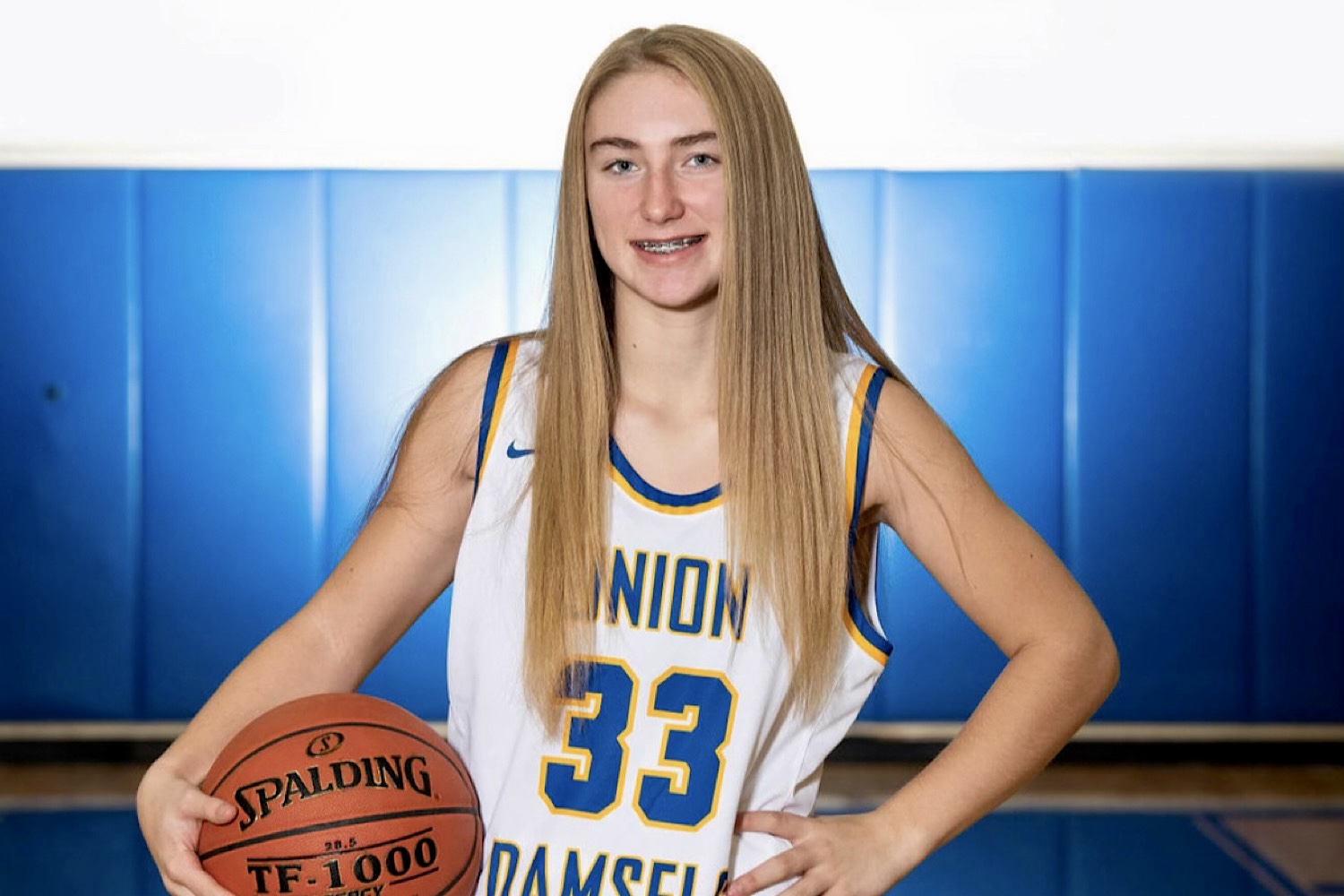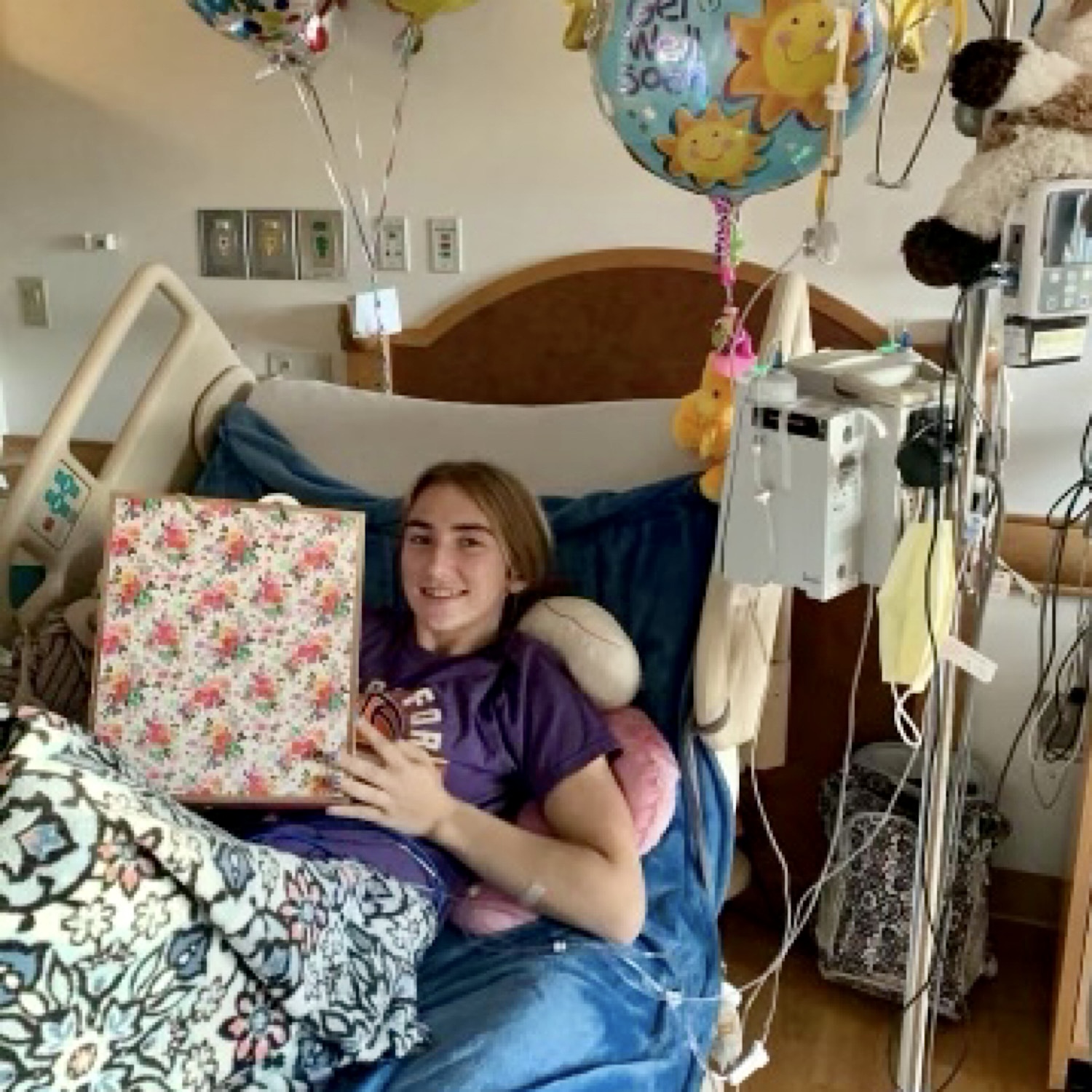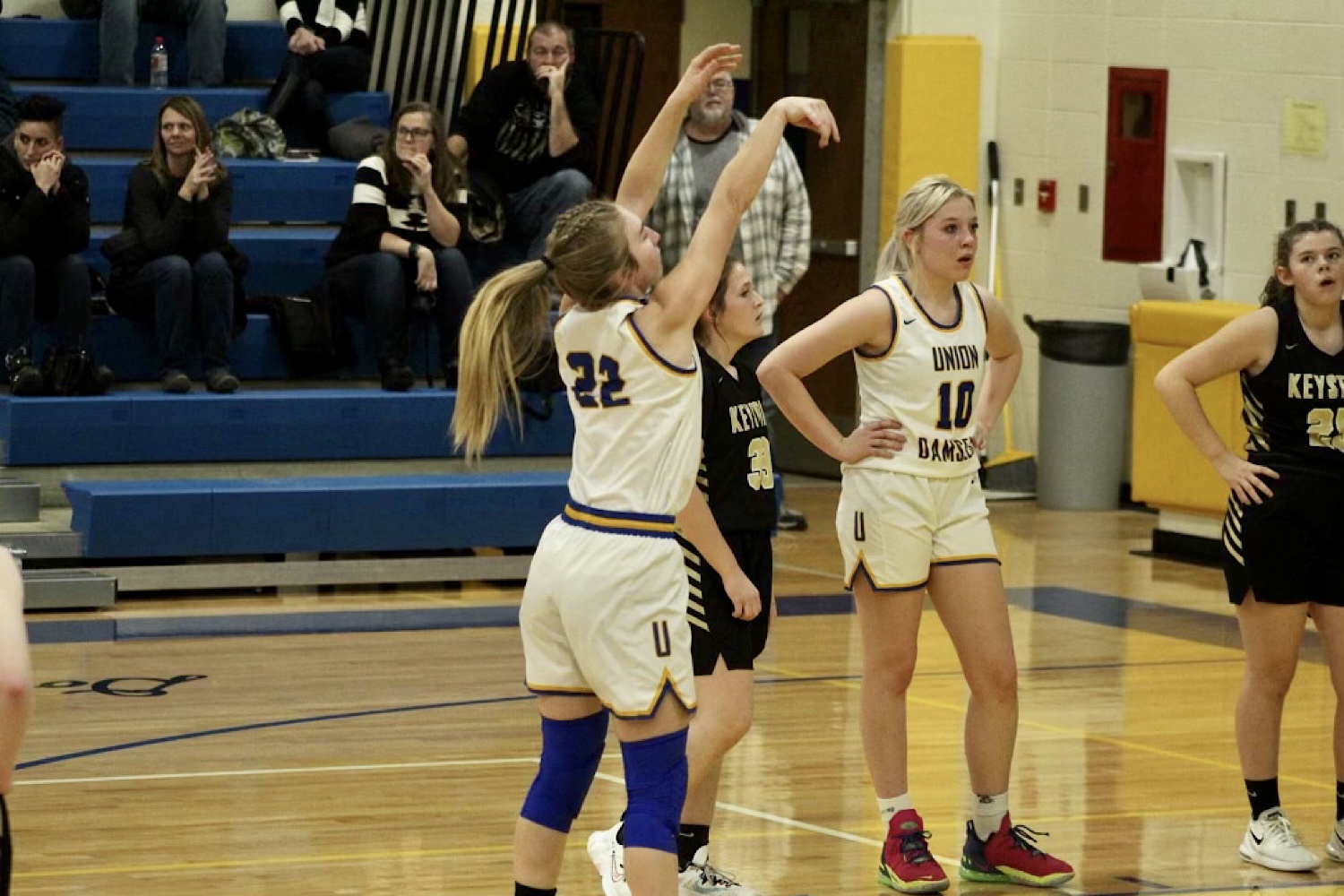
SLIGO, Pa. (EYT/D9) — Why me?
Kya Wetzel never asked that question, even as a serious and debilitating illness consumed her, seemingly overnight.
(Submitted photos)
Even through the pain that doubled her over. Even through the anguish of not knowing when — or even if — her symptoms would subside. Even through the uncertainty if her blossoming athletic career at Union High School and beyond would be over.
Why me? She never asked it, even though it would have been very easy for a 15-year-old girl to do.
Why me?
That’s not in Wetzel’s nature.
“I don’t want sympathy,” she says. “I want support. I don’t like it when people are like, ‘I’m so sorry for you.’ I don’t want people to feel bad or sorry or anything. I’d rather hear the, ‘you’re so strong’ comment than the, ‘I feel sorry for you’ comments.”
To Wetzel, there’s nothing to feel sorry about. While she wouldn’t have chosen to be stricken with a very severe case of ulcerative colitis that required radical surgery, she choses to accept it and use it to raise awareness of the conditions.
“It’s definitely hard,” she says, “but I had to realize I was being put through it for a reason.”
‘WE’RE STICKING YOU IN THE HOSPITAL’
In early June, Kya Wetzel was just another 15-year-old girl with impressive athletic talent and an insatiable appetite to compete.
She was constantly on the go. A standout in softball, volleyball and basketball, she always had a next grounder to field, a next spike to hit or a next basket to make.
Sports were her life. She loved each and every one of them and played them with the same intense passion and zeal.
Then, everything began to change.
And quickly.

She woke up one morning with a cramping pain in her abdomen. Wetzel chalked that up to a simple stomach bug, but as the days passed, her symptoms became more pronounced and severe.
By June 25, she was in anguish. She still played two softball games with her travel team in DuBois that day, even though the pain was almost too much to bear. The next day, she was admitted to Children’s Hospital of Pittsburgh.
“The whole month of June, I played everything, even though I was sick,” Wetzel said. “I went to summer leagues. I went to open gyms. I went to volleyball summer leagues. Went to all my summer softball tournaments and it was very hard. But I’m a very, very dedicated athlete. Until finally they said we’re sticking you in the hospital.”
There was no more waiting to see if she would feel better. It became obvious that was not going to happen.
It also became very clear to Wetzel that something in her gut was seriously wrong.
During softball games, she’d have to run off the field and go to the bathroom after almost every inning.
“I’d ask my mom, ‘How many batters before I’m up?’ Wetzel said. “She’s say, ‘three,’ and I’d run to the bathroom. It was scary. I was fine one morning, then the next morning it was like, ‘What’s going on?’”
Doctors at Children’s made a quick diagnosis.
Wetzel had ulcerative colitis — a very serious digestive disorder.
Ulcerative colitis is a continuous inflammation of the colon.
And often comes with intense pain.
There is no cure.
There are many causes, but the most common is heredity. Wetzel and her parents were dumbfounded, however. No one in either family tree had been stricken with UC.
With the cause unknown, doctors instead focused on aggressive treatments to curb her debilitating symptoms.
NOTHING SEEMED TO WORK
There were days in the months that followed when Wetzel was popping as many as 20 pills to try to give her some relief from the worsening symptoms.
If there was a drug that could quell her ulcerative colitis, doctors tried it.
But nothing seemed to work.
Through it all, Wetzel was still competing in her various sports, gritting her teeth through the discomfort and the pain, painting her face with a smile, even though behind it, she was in anguish.
She wasn’t going to let these conditions stop her. But deep down Wetzel was coming to a sobering realization.
This wasn’t getting better. It was only getting worse.
“This was life-changing,” she said.
She soldiered on. Wetzel struggled her way through the volleyball season this fall at Union. A right-side hitter, she was a starter as a sophomore for the Damsels and didn’t miss a match.
Union’s last game was Oct. 20.
Wetzel was back in the hospital at Children’s the next day. There was no more white-knuckling it. The symptoms had reached a tipping point.
“So, here we are again,” Wetzel said, letting out a soft laugh. “I played a volleyball game the day before I got admitted. They tried another infusion that I was on and then we tried one last medicine.”
The doctor had sobering news for Wetzel.
“You realize if this medicine doesn’t work, you’re going straight into surgery,” the doctor said.
Like all of the others, the treatment failed. There was no other recourse now — Wetzel was facing a colectomy — the complete removal of her damaged colon.
Wetzel had to wait until Nov. 11 for the surgery. It was a painful pause in her treatment, but like she had done throughout her ordeal, she powered through with an attitude that belied the seriousness of her illness.
What she faced after the surgery would break the will of most people, let alone a young girl just starting high school.
THIS IS ME
The surgery to remove Wetzel’s entire large intestine lasted nearly five hours.
Wetzel said the surgeon found that her entire colon was ravaged by the disease.
“He came out to talk to my parents after the surgery,” Wetzel said. “He said that colon needed to come out.”
The recovery was long an arduous, but she found an interesting outlet to help her pass the time while she healed.
Wetzel released her latent artistic side during her hospital stay. Doing various art projects filled the void that was once filled by her many sports.
“I actually did art therapy down in the hospital,” Wetzel said. “We did some drawing. I did some paintings and we did some work with clay.”
Wetzel has many of them hanging or displayed around her Sligo home.
An outpouring of well wishes from the community also made her stay more palatable. It kept her strong. It kept her going.

“The support has been so much help,” she said. “When I was in the hospital, people were sending me cards, between teachers, coaches, teammates, peers in the school, and even some people that I rarely ever talked to — they were sending me e-cards. I actually had some balloons sent. It was such an amazing help.”
Wetzel said she knew she was going to need it.
As a result of the surgery, her small intestine was attached to her abdominal wall and a stoma opened to carry waste out of her body to an external ostomy bag that she must wear on the lower right side of her torso.
Some people who have ostomy bags suffer from anxiety and depression because of the feelings of embarrassment.
But Wetzel has coped with it in much the same way she handled everything during her ordeal.
With uncommon grace.
“I’ve handled it a lot better than what I thought,” Wetzel said. “When they first told me, I kind of felt like I was going to be insecure about it.”
Wetzel pauses and lets out a chuckle. “But actually all my teammates see it and want to talk to me about it. I’m not hiding it. I’m straight up telling them, ‘Yeah, I have an ostomy bag. This is me.”
Wetzel’s diet is restricted while she has the stoma. She can’t eat raisins, corn or nuts — it may clog the opening.
She said she was actually surprised about what she could and could not eat.
“Actually, you would think that I can’t have lettuce and everything because you know how hard lettuce is to digest because of that fiber, But I can have it,” she said. “One of the weird things I can’t eat is mushrooms,” she said, chuckling. “I’m not much of a mushroom fan, anyway.”
FIGHTING BACK
Wetzel is growing impatient.
She has never been idle this long. Her mind wanders. Her desire to get back onto the basketball or volleyball court or softball field very strong.
She has trouble being patient. She wants to be active again. She wants to be competing with her teammates again. But she knows she has to wait.
Recovery doesn’t happen overnight, no matter how much you want it to.
Wetzel was very much looking forward to her sophomore season on the Union girls basketball team under first-year coach Josh Meeker, who returned to the program after his own long hiatus of 10 years.
Meeker is very high on Wetzel. He said he believed she can make an immediate impact when she comes back.
It’s just a matter of when that will be — Wetzel hopes sooner rather than later.

“I see my surgeon on Dec. 12,” she said, almost giddy in anticipation of that appointment and her potential freedom. “That will be a month out of surgery and we are hoping he’ll start letting me practice and work on my conditioning, trying to get that back.”
If she is given the green light, it will be much earlier than expected. The standard recovery time from a surgery like this is more than two months. Wetzel is angling to come back in half that.
“They said two months,” Wetzel said, letting out a mischievous chuckle. “But I’ve been shooting around and dribbling a ball just because I want to get back so bad.”
Wetzel is already back in a way. She attends every practice and made the trip with the team to the tip-off tournament this weekend.
The first time she walked into the gym after her surgery, it came as quite a surprise to her teammates, as well as to Meeker. They weren’t expecting her back so soon.
“When I walked into practice that first time after I got back from the hospital,” she said. “the girls’ faces and Meeker’s face, I will never forget that moment.
“I love supporting my team,” she said. “I’m so happy I can be there, even if I can’t be out on the court with them. I cannot wait to be back out there on the court and the field with all of my teammates. I’m ready.”
THAT’S MY REASON
The ostomy bag she must wear is not permanent.
Eventually, Wetzel will have a stoma reversal surgery. It’s a complicated procedure that will, if successful, allow her bowels to function normally again.
The recovery is long and Wetzel has chosen to make the unusual decision chosen to wait.
Usually, the reversal happens in six months to a year. Wetzel plans to delaying it until after she graduates from Union.
“After realizing how hard to is to sit at basketball practice and not participate, I feel like I want to get through high school and then I’ll go have the reversal done,” Wetzel said. “I’m trying to wait until I graduate because I do sports all year round. I’m on club teams and travel teams and summer leagues in basketball, volleyball and softball. Then I do school sports. I don’t want to stop.”
Her journey has also changed her outlook on life.
She said the time she spent at Children’s was eye-opening. Wetzel interacted a great deal with the specialized GI staff at the hospital and she was inspired to pursue a career in gastroenterology.
“I’m going to shadow my doctor this year,” she said, happily.
Wetzel, who will turn 16 on Dec. 17, is hopeful that sharing her experience will help others who are dealing with similar symptoms or adapting to post-surgery life.
She does believe there was a reason this happened to her.
She still doesn’t ask, ‘Why me?’
Because she already knows the answer and it’s not what most would think.
“I just believe God knew I would be the one to fight though it,” she said. “That’s my reason.”












